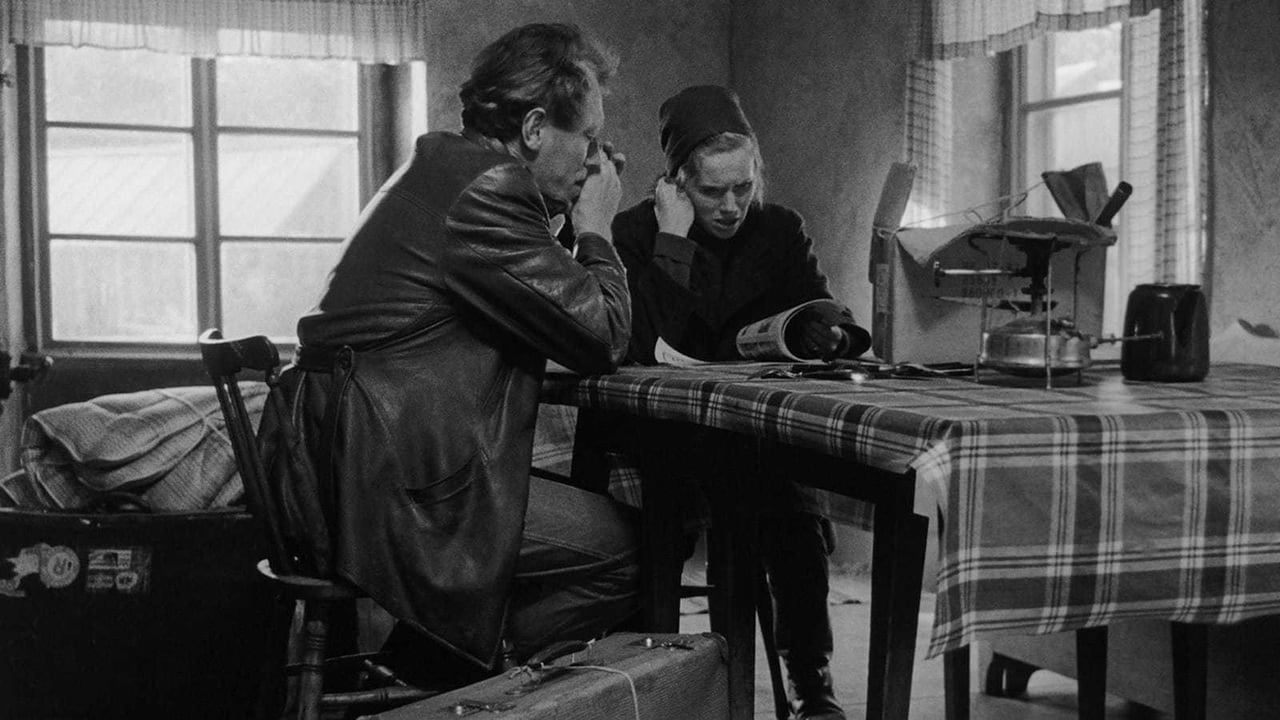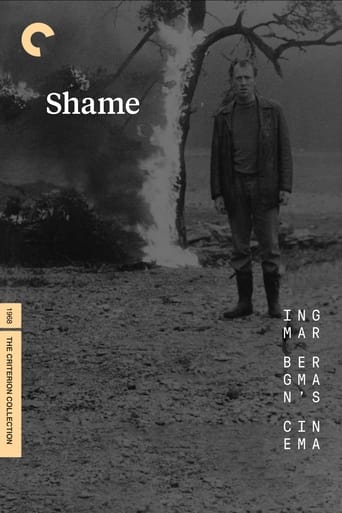

Ingmar Bergman's psychological study of how humans react in a situation of war. The film takes place on Gotland, where invasion forces arrive.Pauline Kael reviewed the film in December 1968, writing, "Shame is a masterpiece, – a vision of the effect of war on two people, – but – it has many characters and incidents – in many ways, (it is) Bergman's equivalent of Godard's Week End – also an account of what people do to survive – Liv Ullmann is superb in the demanding central role, – Gunnar Björnstrand is beautifully restrained as an aging man clinging to the wreckage of his life. The subject is our responses to death, but a work of art is a true sign of life." Bergman is always great, at least in the black and white era. I'm less a fan of his color films. But when you have that crisp, bleak back and white cinematography and Max von Sydow, you can do no wrong.
... View MoreThis begrudging and angry film is against not just the war during which it was made, but all war. It doesn't care what war it is. It might be the most emotionally involving experience I have ever had with Ingmar Bergman's work. There are no sides to the two main characters in this impacting drama, which doesn't intimate a point in any ceremonial symbolism as per Bergman's usual, but plainly showcases people and their lives and exercises what Bergman has already proved he understands about a person's reaction to a movie.His top-drawer regulars Liv Ullmann and Max Von Sydow play an internalizing but bickering married couple who were once orchestra musicians. Now they live in a weathered farm house on an island. Part of the building frustration we grow to share with these two people fertilizes in the detail that nothing in their house seems to work. They are not reclusive intellectuals, either. They are a rather familiar marriage that has more or less resigned from life and is essentially apolitical; they only get wind of distant rumors of a war that has been going on forever. Ullmann is concerned with the danger to their lives and to her desire to bear children. Her husband Von Sydow shrugs off that the war will pass them by. Their serenity is interrupted by screaming fighter planes flying low over their house, the killing of a parachuting airman, the arrival of dubious troops, their inquisition, and eventually their capture by what appears to be the local side, but loyalties have long since splintered. They are sent back to their home, witness gratuitous destruction and suffer the vindictive consequences of such an agonizingly distrustful marriage. This, one of my top favorite Bergman efforts, is a study of a couple jarred from their safely self-unaware lives and violated by a manipulative despair, testing them both to reveal who they really are. She lacks compassion to some extent, too self-serving and restless to have any patience for his capricious breakdowns into crying. His suppressed emotional issues have led to the repression of the very initiative and excitement that attracted them to begin with. The immense last twenty minutes, sporadically interrupted by images of the overwhelming gray sky, are among the closest to real emotion that Bergman ever filmed.All systems of dogma and faith are the antagonists in this very essential and downbeat portrait. The basically clearcut personalities of Ullmann and Von Sydow's characters are hurled into the degenerate world of war because they are accused of being "sympathizers," but the film, shot on Bergman's small home island of Faro, doesn't give any information about where or when it's set, who the two sides are, and for what they're fighting. To an uninvolved civilian caught in between, the knowledge base is likely to be quite similar.Ullmann and Von Sydow are not sympathizers for the apparent enemy, but they're partisans for who are apparently their side. This 1968 reactive allegory could be about the common noncombatant citizens of Iraq, or Kosovo, or Vietnam, or Israel, or Palestine, or...
... View MoreExtremely pinching vision of a war situation where the couple from Vargtimmen (ok, they have different names and initial situations, but the actors are the same) gets caught in the crossfire of two fronts. The depiction of the fighting parties as faceless, superordinate authorities are often captured in sublime surreal pictures and draws interesting parallels to Orwell's 1984, even if Bergman thwarts this context on a personal level of a slowly burgeoning conjugal war. That is why countless fundamental and philosophical questions towards Eva's and Jan's marriage are relevant and essential, while the threat and danger from the outside tears open an abyss in the inside which was toilsomely covered with lambencies before. An intense allegory on the fragile facades of civic conventions.
... View MoreWithout question, Bergman was a master when it came to the cinema of alienation; presenting characters with a singular point of view that is at odds with the world around them, leaving them inevitably cut off and isolated with their own distorted thoughts and fears. In many of his films, this inability to see eye to eye with other human beings - even on an entirely intimate level - leads his characters to seek solace and escape; creating their own limited psychological space and projecting it outwardly in an attempt to remove themselves from the harshness of their true surroundings. Alongside these particular ideas, there are conflicting issues presented by Bergman in other films, for example Persona (1966), in which the outward projection of an idealised world that protects you from the judgements and criticisms of the wider world is internalised; giving way to a breakdown in reality and the projection of various visions that have no clear bearing on the truth. That is what this film is about.Here, we have the idea of war presented as a literal nightmare; with two characters at war with one another and at war with themselves, and all further represented by a landscape of cold uncertainty, violence and turmoil. With this in mind, Shame (1968) is perhaps not the easiest Bergman film to appreciate, though it is one of the most fascinating; especially when we compare it to the similar elements presented in the subsequent film, A Passion (1969). As with that particular film, Shame offers a story about characters in retreat; in retreat from themselves and from the world around them. In Shame, the idea is given further dramatic weight by an approaching civil war set to eventually destroy the walls of cowardice and self-preservation that these particular characters have put up to protect themselves from the harsh realities of life. As the walls begin to tumble, the two characters begin to show elements of their true selves that they have hidden during the idyllic years spent safely hidden away on the island, and the escalating horror of the world itself becomes secondary to the crippling emotional suffocation and psychological breakdown of the characters.There are a number of other, more complex themes analysed alongside this central idea, with the typical Bergmanesque issues of jealousy, adultery, guilt, impotence, lack of communication and the inability or unwillingness to see the world for what it truly is. The film is naturally outstanding on a superficial level; the production design, editing and cinematography are harsh and gritty, the performances from all involved are honest and enthralling, and Bergman's carefully detached presentation of the script lends itself to some truly harrowing sequences that manage to sidestep any potentially fatal moments of melodrama. The film is also notable for what seems like an increased budget - or at least, increased by the standards of many of the filmmaker's more iconic chamber-pieces - with Shame featuring aeroplanes spitting machine-gun fire and shells across the tiny island community, a procession of military vehicles stretching back through a small Swedish town as far as the eye can see, thousands of extras, explosions and costumes, all establishing this callous and nightmarish world that seems to exist without time and context.The fact that Bergman chose to leave the setting of this film a mystery is one of its most interesting aspects. Although the threat of civil war and some of the more heart wrenching depictions of abuse and degradation might suggest the era of the Second World War, the cars and costumes and central ideologies are all very much a post-war, 1960's abstraction. No information about the war is given, other than the fact that it has split the country down the middle (though again, the country is never specified) and both sides seem to be using a regime of violence and threat to manipulate the locals into assisting in their cause. The fact that the war is seemingly secondary to the war that erupts between the two central characters is again a sign that Bergman is using metaphor to externalise a very much internal story, with the inner-battle between two characters being projected out, against the landscape, and resulting in further elements of interpretation that set the scene for Bergman's subsequent film, the tortured masterpiece A Passion.At the end of A Passion we have a vague and enigmatic scene that not only contextualises the whole of that particular film - and its two central protagonists - but also the whole of the film in question. Quite what Bergman was suggesting by this odd sense of duality is ultimately unknown; however, I can only suppose that it points towards something of a dissatisfaction with Shame and its overall intentions; with Bergman feeling the need to clarify his own purpose with that subsequent film. Was he unhappy with Shame? Did he feel the story became lost in the superficial qualities of production design and special effects? Or that the political attack and its subtle comment on the mechanics of the Second World War were too sharp? Who knows? Admittedly, the sense of abstraction here is understated more so than in many of Bergman's other films, for example, Hour of the Wolf, which used elements of horror and supernatural iconography to underpin the story of an artist driven mad by personal demons and ghosts from the past, but I feel that Bergman is clearly attempting something similar with this story of two seemingly mild-mannered, pacifistic musicians discovering darker shades of their personalities when threatened by the approaching war.With this in mind, there are the obvious themes of dehumanisation, as the wheels of war destroy everything including the human spirit, but I'd imagine there are even deeper themes than that; something that is perhaps only truly felt when we watch the two films together, and see Bergman's perhaps cruel mocking of his characters, and the subtle line in which one painful nightmare bleeds into the next.
... View More